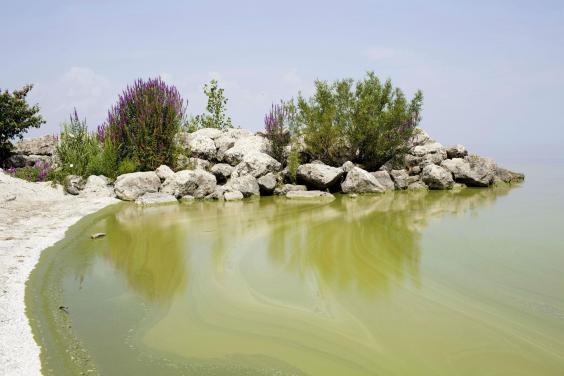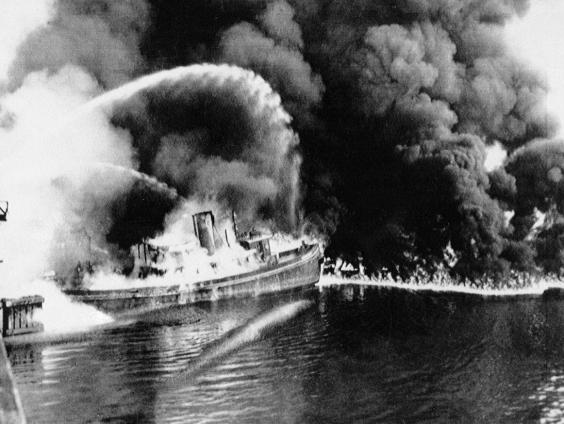As someone who spent decades living near the Great Lakes, composer Margaret Brouwer has witnessed the shifting environmental fortunes of this vast and crucial body of water.
She knew the stories about the Cuyahoga River (which empties into Lake Erie) catching on fire, having become so polluted that its surface was literally flammable. She watched too, after the 1972 passage of the Clean Water Act helped turn things around and let nature flourish.
In recent years, she has seen Erie’s health reverse. Runoff from agriculture and the impact of warming lake temperatures have resulted in large areas inundated with thick green algae. Locals call them “dead zones”. Environmentalists fear Donald Trump’s plan to roll back regulations to “1960s levels” is poised to make things worse. Ms Brouwer decided to raise awareness by composing and staging a special composition – Voice of the Lake – and involve local people.
“I’m very much an environmentalist and have known about the lake. After they passed the Clean Water Act, in the Seventies, Eighties and Nineties it was so beautiful. Then it got worse,” Ms Brouwer, 77, told The Independent.
“The Great Lakes are the largest clean water system in the world. It’s so beautiful and it seems important to try and preserve it for our own enjoyment.”
Last year, the Associated Press reported that many water bodies in the US suffered from pollution from nitrogen and phosphorus that fed algae. It found government agencies had spent billions of dollars trying to address the problem but had little to show for their efforts.
Meanwhile last month, US-Canada advisory body the International Joint Commission found that both countries had much to do to deal with the environmental challenges that threaten the five lakes, which provide drinking water to 40 million people.
“While significant progress has been made to restore and protect the lakes, the governments of Canada and the US and Great Lakes civil society as a whole are living with the costly consequences of past failures to anticipate and prevent environmental problems,” it said.
Josh Mogerman, an expert with the Natural Resources Defence Council, said Lake Erie suffered from two particular problems. One was that agricultural runoff was exempted from Clean Water Act. The second was that Erie was the shallowest of the Great Lakes, and therefore more susceptible to the impact of climate change, which was resulting in warmer water temperatures which in turn were encouraging the growth of algae.
Ms Brouwer’s oratorio, which recently had its debut, includes lyrics, or a libretto, that feature words from Cleveland-born poet David Adams, and witness statements from people who testified to a public hearing over whether the Army Corps of Engineers should dredge the Cuyahoga and dump it directly into the lake.
“I wanted to quote the actual people,” she said. “There was a long letter from a colonel from the Army Corps of Engineers, so I included that.”
Ms Brouwer’s four-part, 70-minute composition also raises awareness by including local performers and musicians. The premiere involved her own Blue Streak Ensemble, the Oberlin Musical Union, conductor Domenico Boyagian, the Cleveland Institute of Music Children’s Choir, and four soloists – soprano Angela Mitchell, mezzo-soprano Merav Eldan, tenor Brian Skoog and bass Bryant Bush.
Mr Boyagian said the composition was a way for fans of classical music to have an active role. “Everyone has their own way of being able to approach the situation – either watch where you throw your plastic, or don’t pollute the river if you’re a corporation, or let’s write a piece about it and let people know what’s going on,” he told GreatLakesToday.org.
Ms Brouwer said she believed music had the power to have an impact. “I thought this was something I could do to draw attention. And if you think of some of those folks songs from the Sixties, they did bring change,” she said.
“Music speaks in a different voice. It speaks equally to the emotion and the intellect.”
Since entering the White House, President Trump has already signed several executive orders that worked to undo many of the environmental regulations introduced by Barack Obama. He recently said he wanted to reduce the level of federal regulation to what it was in 1960.
“We’re here today for one single reason: to cut the red tape of regulation,” he said.
Activists say they fear Mr Trump’s moves will only exacerbate the problem facing the Great Lakes.
“They are going tooth and nail after every regulation,” said Charlie Cray, a senior research specialist at Greenpeace USA. “It’s an industry wish list.”









